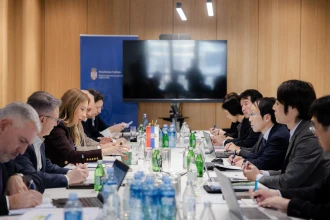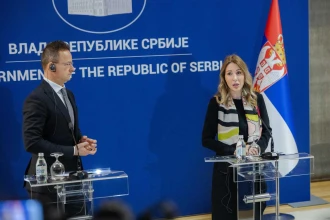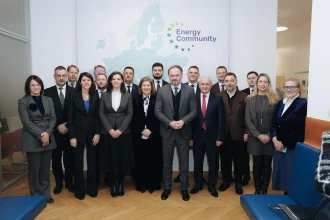Minister of Mining and Energy Dubravka Djedović Handanović met today with Hungary's Minister of Foreign Affairs and Trade, Péter Szijjártó, and stated that Serbia is ready to continue to deepen its energy partnership with Hungary, including through new joint projects.
Djedović Handanović and Szijjártó Discuss NIS, Serbia-Hungary Pipeline, and Gas Supply
Djedović Handanović expressed her gratitude to Hungary for its support of Serbia and the Naftna industrija Srbije regarding the issue of imposing sanctions and the maintenance of regional oil supply stability.
"I would like to thank Hungary for its support – it is in difficult times that you recognize true friends. We are waiting for a response from the American side, as we have requested a 90-day postponement of sanctions, and I believe that it is also being considered by the State Department. We are also waiting for the Russian side, as they, too, need to take certain steps since their company is facing sanctions. There are also challenges with financial institutions, particularly regarding NIS's lending and payment transactions and the consequences that the introduction of sanctions would have. Banks will be reluctant to work with a company under sanctions, and that then calls into question payment by credit cards at petrol stations. We have done everything we can. As of today, we are continuing consultations with both the Russian and American sides, and the situation is far from simple," Djedović Handanović stated.
One of the topics of discussion was the cooperation between the two countries in gas supply.
"Serbia and Hungary have proven many times in recent years, in the midst of the energy crisis, that they are reliable partners. Our economic cooperation is constantly improving, based on good political relations and the the good rapport between President Vučić and Prime Minister Orbán. It is in our mutual interest for the supply through the Balkan Stream gas pipeline to continue without interruption, and last year, gas transit to Hungary via Serbia increased. Hungary is our reliable partner in gas storage, with about 49 million cubic meters currently in storage there. I expect that we will continue our cooperation after April 1, as gas companies are currently negotiating commercial terms. "Gas prices are at their highest in the past 24 months, exceeding $600 per thousand cubic meters, but we continue to rely on favorable prices thanks to the Balkan Stream gas pipeline and our Russian partners," said Djedović Handanović after the meeting with the Hungarian delegation, led by Szijjártó.
Speaking about the construction of the Serbia-Hungary oil pipeline, the Minister stated that this project should provide additional long-term security of oil supply for both countries, along with an alternative supply route for Serbia. "So far, the Conceptual Solution and the Conceptual Design with a Feasibility Study have been completed. We will continue working on the remaining technical documentation, with the goal of starting construction by the end of this year or early next year," said the Minister, adding that discussions are ongoing regarding the oil pipeline's capacity to ensure it serves as a genuine alternative to the route through Croatia.
The Minister also noted that there is potential for further improvement of cooperation in the energy sector and in the fields of electricity, including renewable energy sources, nuclear energy, and the construction of the Paks NPP, as well as energy storage. "We continue to develop the Pannonian Corridor project, which will enable more efficient energy transmission. Also, the first regional power exchange has been established, with Serbia, Hungary and Slovenia as partners, which improves trading conditions and facilitates greater exchange and secures more favorable prices," Djedović Handanović added.
Hungarian Foreign Minister Péter Szijjártó said that energy crises have increasingly become a frequent challenge, and that in such an environment, it is crucial to strengthen close regional cooperation.
“Today, we can say with certainty that there is no energy security for Hungary without Serbia, given that gas supply is almost 100 percent covered by Serbia. Last year, a record was achieved in gas deliveries, with 7.6 billion cubic meters reaching Hungary via TurkStream. Serbia has once again demonstrated that it is a reliable transit country and that it significantly contributes to the stability of Hungary’s gas supply,” Szijjártó said.
He warned that the political decisions made by the Biden administration, through the imposition of sanctions on NIS, could have serious consequences.
"If Serbia cannot rely on oil processing in its refinery, there is a real danger that all of Central Europe will feel the consequences of such political decisions. Fortunately, today the US has an administration that does not treat the Central European region as an enemy, but rather treats us in a friendly manner. We have agreed to establish close regional cooperation and ensure an uninterrupted fuel supply in the region in the event of sanctions," Szijjártó stressed, adding that Hungary and Serbia continue to strengthen their energy cooperation with the aim of ensuring a stable supply of energy sources and protecting the interests of their citizens and economies.
In addition, he added that Hungary and Serbia have agreed to double the exchange of electricity by 2028, which will further ensure the energy stability of the region.




.webp)







